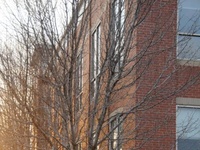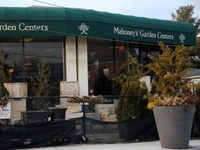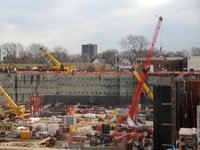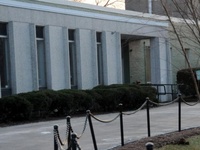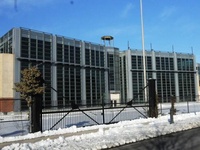Following Harvard’s decision last month to slow construction of its much-anticipated Allston science complex, local residents have escalated demands for the University to lease its thousands of square feet of vacant properties in the neighborhood.
Early last week, in reaction to the decision, a local group hung multiple banners—including one that stated in large, red letters, “It’s time for resistance”—on empty Harvard-owned buildings. A few days later, Boston Mayor Thomas M. Menino responded to Harvard’s announcement by asking it to provide the City with an inventory of current Allston property holdings and their planned uses in a letter to University President Drew G. Faust.
Some local residents have long said that Harvard’s vacant properties reduce the attractiveness of the neighborhood and harm existing businesses, and that the businesses that have been brought in by the University do not cater to the needs of the community.
Now, with the slowdown casting doubt on Harvard’s construction timeline in Allston, residents are growing concerned that businesses will steer clear of the area, scuttling hopes for a revitalized Allston in the near future.
“If this city can’t attract the momentum that’s going to make this a standalone part of the Harvard campus, it’s going to become a backyard,” said Allston Task Force member John Cusack.
‘NON-LEASABLE’
Harvard officials say they are continuing to consult regularly with the city to fill vacant properties with new tenants, including six new businesses they say have signed leases with Harvard in the past 18 months.
“We understand the concerns our neighbors and the city have expressed, which is why we’ve been so aggressive in our efforts to lease available property,” said University spokeswoman Lauren Marshall, who also said that 85 percent of Harvard’s 892,317 square feet of leasable property in Allston had tenants.
But that number excludes the 790,000 square feet of property that Harvard designates as “non-leasable,” a controversial definition Harvard gives spaces it says are either unfit for tenants or reserved for construction plans. For example, the Brighton Mills Shopping Center—which includes a large vacant former Kmart—has been set aside for the planned relocation of the Charlesview apartments.
Some neighborhood residents question the category’s legitimacy, calling it an attempt to disguise the true blight of vacancy in Allston.
“This is all sort of legal mumbo-jumbo betraying the damage that Harvard has done to this neighborhood,” said Harry Mattison, an Allston Task Force Member. He added that the neighborhood has always been “sort of the stomping ground for non-desirable uses.”
Even the 15 percent of “leasable” Harvard properties left vacant, though seemingly insignificant, “has a higher impact when seen in a smaller neighborhood context,” said Mike Glavin, deputy director for institutional development for the Boston Redevelopment Authority, the City’s chief planning agency.
Despite such concerns, the Unviersity has continued to buy property. In late December, the University purchased a 29,700 square foot building adjacent to Brighton Mills, but said that the current tenants would remain on-site and that Harvard had no short-term plans to use the property.
The University has denied repeated requests by local residents and city officials to place a moratorium on future land purchases, saying that certain parcels contiguous to current holdings may still be considered for acquisition.
At a task force meeting last week, Boston city councilor Mark Ciommo implored Harvard to stop buying properties in light of its planned slowdown.
“At least commit to finishing the science complex,” he said, “maintain the properties you have now, and don’t landbank any more.”
A DREAM DEFERRED?
With the slowdown in construction of the Allston science complex, local residents have become increasingly worried that the promised renewal of Allston will fall prey to Harvard’s shrinking budgets.
Harvard urban design Professor Alex Krieger says the vacant properties lining Allston’s main streets serve as a reminder of just how long it may take Western Ave. to become the bustling retail thoroughfare that planners have envisioned.
Krieger says the University’s vision for Barry’s Corner—heralded by planners as a future hub in Allston akin to Harvard Square—may be restricted by existing competition from nearby lively streets, such as Harvard Street and Mass. Ave.
“There might not be a sufficient demand these days for more shops and more cafes,” he said.
Currently, Barry’s Corner features only a small convenience shop, a gas station, a Dunkin Donuts, and a vacant former Citgo station owned by Harvard.
“It’s where the recycling trucks are parked, where the shuttle buses are parked—the kind of things you want to keep but don’t want to look at,” said Task Force member Mattison.
University officials cheered last summer when they leased property only a few blocks away from the Corner to Finale Dessert Company, but residents have come to see the building—which contains no retail outlet and only houses the company’s central pastry kitchen—as an example of Harvard’s failure to deliver on promises to revitalize the neighborhood.
Finale owner Paul Conforti said that both he and Harvard had made clear that there were no plans to establish a retail shop in Allston at the outset of the lease. But he said that his company would consider doing so if enough demand materializes, noting that a small portion of the current building has been earmarked for such a possibility.
Task Force Chair Ray Mellone agreed that Western Ave. is a “long way from becoming a main street or downtown business section” and suggested Harvard use its Business School faculty to identify and recruit businesses that would thrive in an academic neighborhood such as the one envisioned in Allston.
“In the interim, we get tenants for the sake of having tenants,” Mellone said. “But I think the best way to play in for the future of the neighborhood is to look at academic uses...if this works out, this could be a great big quality of life boost for everyone.”
Harvard Design School Professor Richard Peiser, an expert on real estate development, said that while Harvard’s slowdown in Allston might initially discourage investment in the neighborhood, the University’s presence will have a positive impact on property value and the attractiveness of Allston in the long run. He added that many of the vacant properties were designed for industrial and office use, making them difficult to sell on the retail market.
“The neighborhood has a tendency to blame the University wherever they can, and I think the only thing they have any grounds to be upset on right now is slowing construction on the science building,” Peiser said. He added that the neighborhood may need to wait years, if not decades, to see Allston revitalized.
“Fifty years from now, [Barry’s Corner] will be just as important as Harvard Square is,” Peiser said. “It takes a long time for a project like that to happen and mature.”
—Staff writer Vidya B. Viswanathan can be reached at viswanat@fas.harvard.edu.
—Staff writer Peter F. Zhu can be reached at pzhu@fas.harvard.edu.
Read more in News
Barker Center Ends Free Coffee Program









